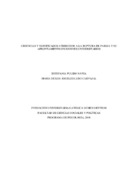Creencias y significados atribuidos a la ruptura de pareja y su afrontamiento en jóvenes universitarios
Resumen
Este estudio aborda el tema creencias y significados atribuidos a la ruptura de pareja y su afrontamiento en jóvenes universitarios. El objetivo de investigación es explorar, analizar y comprender cómo se configuran estas creencias y significados en los relatos de los participantes. Para ello se contó con la participación de seis (6) jóvenes universitarios de la Fundación Universitaria Católica Lumen Gentium (FUCLG) con edades entre los 18 a 25 años. Esta investigación es de modalidad cualitativa con diseño fenomenológico y entrevista en profundidad. Se diseñó y empleó una guía de entrevista para explorar los significados frente la ruptura de pareja, las creencias sobre su afrontamiento y la relación entre ambas categorías. Los resultados indican que los participantes atribuyen significados positivos y negativos a la ruptura de pareja; algunos centran su atención en las ventajas y otros en las desventajas de la ruptura; siendo el caso que los significados negativos se presentan en mayor medida poco tiempo después de la ruptura, cambiando con el paso del tiempo. Por su parte, las creencias sobre el afrontamiento se orientan hacia un estilo centrado en el problema cuando los significados de la ruptura permiten considerar la ruptura como una adversidad que la persona puede superar; las creencias sobre el afrontamiento se orientan hacia un estilo centrado en las emociones cuando los significados sobre la ruptura dificultan la aceptación de esta. En todo caso, el apoyo familiar resultó una estrategia de afrontamiento central en el discurso de los participantes. Finalmente, se encontró que las mujeres se inclinan más por utilizar estrategias de afrontamiento centradas en las emociones, mientras que los hombres utilizan más las que se centran en el problema, encontrando también que el apoyo familiar es fundamental para el afrontamiento.
Abstract
This study addresses the topic beliefs and meanings attributed to the breakup of couples and their coping in young university students. The objective of the research is to explore, analyze and understand how these beliefs and meanings are configured in the stories of the participants. To this end, six (6) young university students of the Lumen Gentium Catholic University Foundation (FUCLG), aged between 18 and 25 years, participated. This research is of qualitative modality with phenomenological design and in-depth interview. An interview guide was designed and used to explore the meanings of the breakup of couples, the beliefs about their coping and the relationship between both categories. The results indicate that the participants attribute positive and negative meanings to the rupture of the couple; some focus on the advantages and others on the disadvantages of the break; being the case that the negative meanings appear in greater measure shortly after the rupture, changing with the passage of time. On the other hand, the beliefs about coping are oriented towards a problem-centered style when the meanings of the break allow us to consider the break as an adversity that the person can overcome; The beliefs about coping are oriented towards a style centered on emotions when the meanings about the break make it difficult to accept it. In any case, family support was a central coping strategy in the discourse of the participants. Finally, it was found that women are more inclined to use coping strategies focused on emotions, while men use more those that focus on the problem, also finding that family support is essential for coping.
Keywords
Affective lossColecciones
- Psicología [203]

